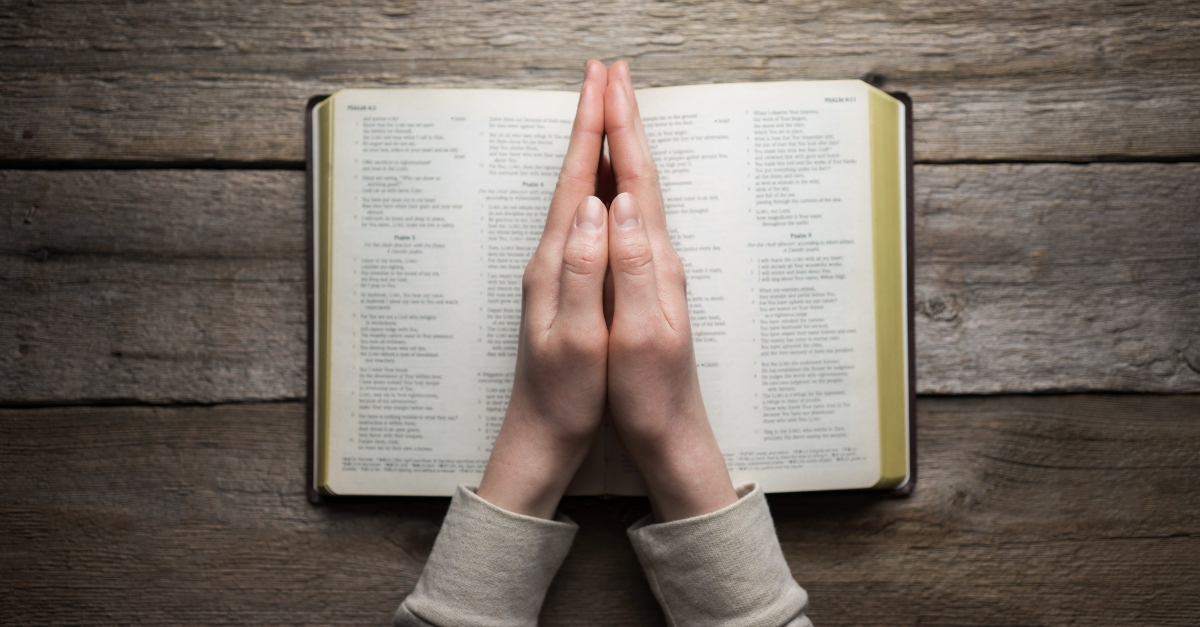
It was supposed to be a day of celebration. Parades, families, music, food, flags, and fireworks. But it wasn’t for seven individuals. It was the day they would die, at the hands of a lone gunman, who had a different idea about “celebrating.”
This was the leading news in Chicago (and nationally) this past Fourth of July. I know, because I live near that city. I’m used to—how sad to have to say that—hearing about gun violence in the Windy City. It’s a daily occurrence. But not like this. Not a mass shooting.
This past holiday’s tragedy (and all others, for that matter) was a poignant opportunity to pray, especially the Lord’s Prayer. “Lord, be with the victims’ families. Give them this day what they need most: your comfort, your strength, your peace. Help them to heal. Help them to forgive. Protect them from the temptation to sink into bitterness and anger and unforgiveness. Surround them with believers who will share with them the hope, compassion, and love of Jesus Christ.”
For certain, the disciples did not have mass shootings in mind when they asked Jesus, “Lord, teach us to pray,” in Matthew 6:9-13. But they did have a deep desire to converse with God one-on-one, and to make intercession for themselves and others, just as Jesus did. But they did not know how. Hence, their one-time request and the teachable moment.
Like the disciples, how many times have we not known how to pray, particularly when faced with a difficult situation—whether our own or another’s—or seen a horrific event unfold on television and not known how to intercede for the hurting, the suffering, the lost?
Thankfully, when words escape us, we have The Lord’s Prayer (also called “The Model Prayer” and “The Disciple’s Prayer) to help and guide us. In fact, there are innumerable ways in which to utilize the Lord’s Prayer. Here are just a few.
Photo Credit: iStock/Getty Images Plus/4maksym
What Is the Lord’s Prayer?
The Lord’s Prayer was not necessarily meant to be a ritualistic recitation. It is not a prescriptive pattern for prayer but, rather, a descriptive template. Jesus told his disciples to pray “like” this, meaning their own petitions were to be similar in nature and content to the example set forth, but not necessarily prayed verbatim. Rather, they were given the freedom to pray the prayer in their own words, as long as they maintained its biblical integrity and intent.
As Martin Luther said in his commentary on The Lord’s Prayer, “These thoughts may be expressed, if your heart is rightly warmed and inclined toward prayer, in many different ways and with more words or fewer. I do not bind myself to such words or syllables, but say my prayers in one fashion today, in another tomorrow, depending upon my mood and feeling.”
That said, there are innumerable ways and opportunities in which to utilize the six intercessory petitions every day. Here are just a few.
1. When God’s name is maligned.
“Hallowed be your name.”
How often do we hear God or Jesus’ names being taken in vain, abused, and blasphemed? Too often. This violates the First Commandment in Deuteronomy 20:7, “You shall not misuse the name of the Lord your God, for the Lord will not hold anyone guiltless who misuses his name.”
God’s name should be—must be!—hallowed. Revered. Reserved for sacred mention only. Yet too many people “misuse” those two precious names.
So, we can pray:
- That God’s name drips from our own lips with reverence and love.
- For the courage to gently admonish those who malign it in our hearing.
- For the day when, at the name of Jesus, every knee will bow, and every tongue confess that he is Lord (Philippians 2:10-11).
Against the false teachers of this world, who deceive and misdirect weak souls, all in the name of God, that they would be silenced in their preaching and boasting, and be convicted of their defiling and dishonoring abuse of God’s name and his Word.
2. When watching the news.

“Your kingdom come.”
This petition is evangelistic in nature, of inviting God to extend and enlarge His kingdom throughout the world. To that end, the daily news offers us extraordinary opportunities to pray for kingdom advancement, even in the midst of horrific circumstances, whether locally or globally.
When we hear of racial disparity or natural disasters, political upheavals or divisiveness, sex trafficking and kidnappings, mental health and anger issues, warfare or random, senseless acts of violence, we can put forth this petition, “Your kingdom come, Lord, in the midst of this situation.”
We can expand that petition to include any believers—whether missionaries, pastors, or lay persons—who might be present in those situations (think of Ukraine, mass shootings, riots, and protests), moving among and helping the suffering, confused, and displaced. Pray that these warriors will be proactive in proclaiming the Good News of Jesus Christ, and that those who hear the message will have receptive and responsive hearts.
Regarding Ukraine, which is currently in the news almost nightly, Rev. Franklin Graham told Fox News Digital about the 3,200 Ukrainian churches Samaritan’s Purse has partnered with through the years for gospel outreach and the Operation Christmas Child project: “These churches are filled with incredible people who are continuing to serve God even now in the most difficult of times.” And they need the continual spiritual support, encouragement, and protection of their fellow believers from around the world if their kingdom work is to prevail.
To that end, pray also for the humanitarian efforts in war-ravaged countries, that food, medicines, supplies, and clothing will be provided, that peoples’ immediate needs will be met, and lives will be saved.
Offer supplications for the injustices both here in America and around the world, for the voiceless men, women, and children who are abused, mistreated, and even killed by their own indifferent governments and leaders. Pray for God’s will to supersede that of evil dictators’ wills. Even if we don’t know specifically what to pray, we can pray in general, “Your will be done, Lord, in that state/country/leader/government.”
Furthermore, plead that those who work against the Gospel, who plague and persecute the Lord’s ambassadors and try to silence them, who try to hinder the kingdom/church and its growth, whether through threats, imprisonments, or even executions, are thwarted.
Photo Credit: ©GettyImages/Tero Vesalainen
3. For physical needs.
“Give us today our daily bread.”
This petition speaks to the basic needs of food and clothing we all (indicated by the “us”) have every day. We should pray this petition not only for ourselves but for all people, everywhere. With these alone, God says we will be “content” (1 Timothy 6:8).
Pray for:
- Those in famine-ravaged countries, that food will reach them, particularly the children.
- Those who rely on food pantries and shelters, that people will be generous in their donations of food staples, and clothing.
- Opportunities to personally meet these needs: i.e. donating food to a pantry, buying gift cards to a fast-food establishment, or filling bags with simple food items (granola bars, trail mixes, apples, water bottles) and then giving them to those living on the streets.
- Opportunities to volunteer at a local pantry or shelter.
- Your heart to be “content” with what God provides every day, that you would be free from the greed for more, bigger, better.
- The joy, appreciation, and thankfulness for the daily provisions given by your gracious God.
4. For spiritual needs.
“Give us today our daily bread.”
“Our daily bread” can also refer to spiritual sustenance: prayers, comfort, strength, a sense of God’s peace and presence. The expression for daily bread indicates not merely “…for earthly nourishment; it is the bread for the eternal day of the Kingdom of God, for the nourishment of our immortal soul. This living, supersubstantial bread is Christ Himself. In the Lord’s Prayer, then, we are not asking merely for material bread for physical health, but for the spiritual bread for eternal life.”
To that end, ask Jesus, the Bread of Life, to spiritually sustain you, and those everywhere; to provide hope during your darkest times, peace during your turbulent times, comfort during your saddest times, strength during your weakest times.
5. When needing forgiveness.
“Forgive us our trespasses.”
This powerful petition is designed to draw us into deeper holiness. As “set apart” children of God, we should try to maintain lives of purity, as free from sin as we can, with the Spirit’s help. But when we do sin—and we will, being imperfect, fallen people—we have this simple petition to pray in the moment of humble conviction. “Lord, forgive me of my sin.”
God is more than willing and ready to forgive, then. “If we confess our sins, he is faithful and just and will forgive us our sins and purify us from all unrighteousness” (1 John 1:9).
And not just temptations, says author C.S. Lewis, but also struggles, trials, and tests: “What Jesus is really teaching us here is something akin to asking God to make our paths straight.”
6. When needing to forgive another.

“As we forgive those who have trespassed against us.”
We also recognize that others are just as imperfect and fallen as we are. Therefore, we need to offer them forgiveness as well, to release them from the “debt” they owe us for any insults, slights, careless words, or wrongs they may have committed against us. Just as Jesus would do for us.
7. When needing to withstand temptations.
“And lead us not into temptation, but deliver us from the evil one.”
Perhaps Jesus had his own wilderness testing in mind when he included this last petition, knowing firsthand what it’s like to be tempted by Satan and then be safely delivered from his traps (Matthew 4:1-11). Similarly, Jesus warns us to “keep watching and praying that you may not enter into temptation; the spirit is willing, but the flesh is weak” (Matthew 26:41 NASB).
Therefore, this petition can be used to:
- Pray for our own and other peoples’ protection from the temptations that can easily draw us/them away from God.
- Pray for protection from Satan’s “flaming arrows,” which are meant to damage (even destroy) our faith and testimony in this world.
- Pray for all world leaders, that their hearts will be softened and humbled enough to recognize that their positions are ones of privilege, that they can resist the temptation to abuse their positions with over-reaching power and authoritarianism.
In Conclusion
It’s impossible to exhaust the number of ways in which we can pray The Lord’s Prayer. And it is so beautiful and so simple, and yet so profound, that it can sustain a lifetime of prayer without requiring complicated words or flowery language, persuasive arguments, or depth of skill. Just pray it, as the Spirit leads you, in your own precious words.
After all, says Pastor John MacArthur, “The purpose of [The Lord’s Prayer] is seen more in the overall thrust of these five verses than in any particular word or phrase. From beginning to end the focus is on God, on His adoration, worthiness, and glory. Every aspect of true righteousness, the righteousness that characterizes God’s kingdom citizens, focuses on Him. Prayer could hardly be an exception. Prayer is not trying to get God to agree with us or to provide for our selfish desires. Prayer is affirming God’s sovereignty, righteousness, and majesty and seeking to conform our desires and our purposes to His will and glory.”
Photo Credit: ©GettyImages/PeopleImages